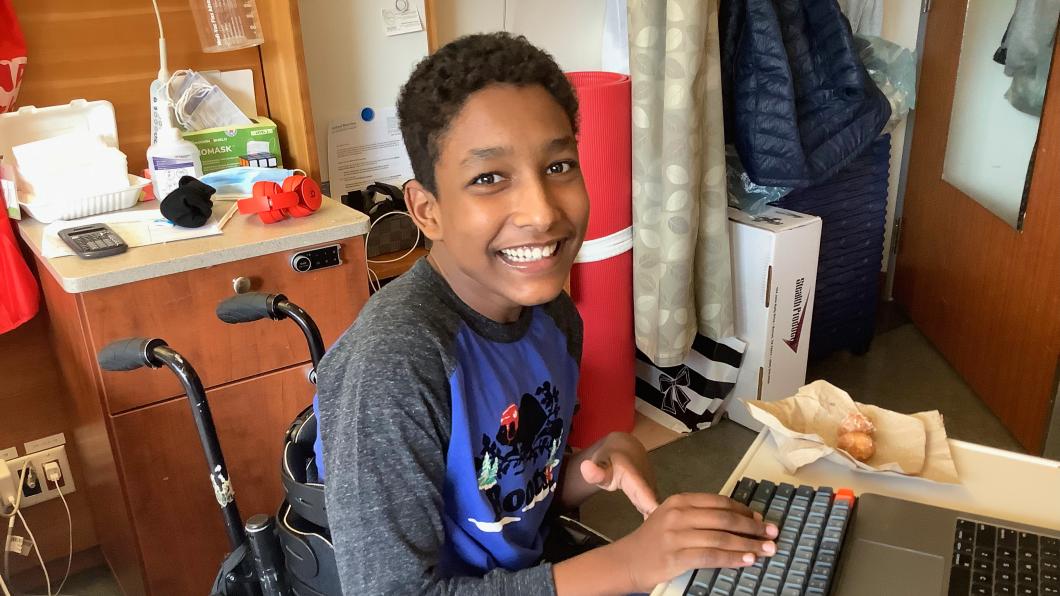
In hospital, Sooni perfects his ability to adapt
By Louise Kinross
Sooni Mohammed recently spent almost six months doing rehab at Holland Bloorview following knee surgery. "He is an amazing young man who is very into science and math and is working towards being a software engineer," said Shannon Crossman, Holland Bloorview's coordinator of Respite, Music and the Arts. Sooni, 16, who has cerebral palsy, did an interview with BLOOM about how he coped with his long hospital stay.
BLOOM: What did you find most challenging about living in hospital?
Sooni Mohammed. Being able to find space away from my parent. Having to share a room with someone else for that long isn't as easy as you would think it is. You and the other person might reveal things about each other that you didn't notice before. After a while, once you start solidifying your stance, those arguments can be very intense.
BLOOM: What helped you cope with that?
Sooni Mohammed: Every inpatient client gets assigned a social worker. So when I feel stressed I really benefit from talking through things out loud to someone else. I would have weekly sessions with [my social worker] but when things filled up to the brim, I could wheel to her office and pour out my feelings. Towards the latter half of my admission, Bloorview hired a psychologist for inpatient families and as a result I slowly transitioned to meeting with her with the help of my social worker.
BLOOM: Do you have any advice for how parents could make sharing a room less difficult for their child?
Sooni Mohammed: If they live close enough, go home in the evening. During the day, that patient might need their parent's support with speaking to clinicians but the evenings are pretty chill. Usually past 5 is when things start to die down and clients do their exercises, go to recreation, that sort of thing. I think this is a good time for parents to step back because allowing your child to navigate these activities will definitely boost their independence.
BLOOM: You mentioned you had surgery due to dislocated patellas in your knees. That sounds very painful. What were you working on in rehab?
Sooni Mohammed: One of the things I was working on was getting used to my knees not dislocating every time I bent them. That was a huge adjustment. But the main thing was getting my strength back and being as functionally independent as possible. I could barely walk prior to the surgery and as a consequence my legs weren't as strong. It took a while but with time and hard work, I could walk with my walker and do all my daily activities mostly independently.
BLOOM: Do you have any advice for other children who may be coming here as inpatients?
Sooni Mohammed: My greatest advice would be to not be afraid to use the services that are offered to you.
BLOOM: What did you like about the care you received?
Sooni Mohammed: It was like a breath of fresh air because finally people started speaking with me as if my disability wasn't a factor. This treatment brought me great liberation because I had the courage to ask and expect this type of treatment from other people outside Bloorview.
BLOOM: It's great to hear about the connections you made with your social worker and psychologist. Shannon mentioned you had some other interesting coping strategies.
Sooni Mohammed: Shannon definitely got that my coping strategies were a bit more peculiar than most. I really enjoy school and so when I feel stressed, I cathartically drown my worries into my homework.
The second strategy I developed is coding and building apps, because when I code, most of the time people don’t understand what I’m doing, and so that gives me an overwhelming sense of independence. I’m actually currently developing a recipe manager app called Dishful. It's like a real recipe book or cookbook, just in an app!
BLOOM: Are there ways we could improve the care we provide?
Sooni Mohammed: Some improvement suggestions are to let physiotherapists enter the pool with patients (I understand the COVID limitations) so they can reap the full benefits, and healthier and more nutritious meals for inpatients.
Like this interview? Sign up for our monthly BLOOM e-letter. You'll get family stories and expert advice on raising children with disabilities; interviews with activists, clinicians and researchers; and disability news.